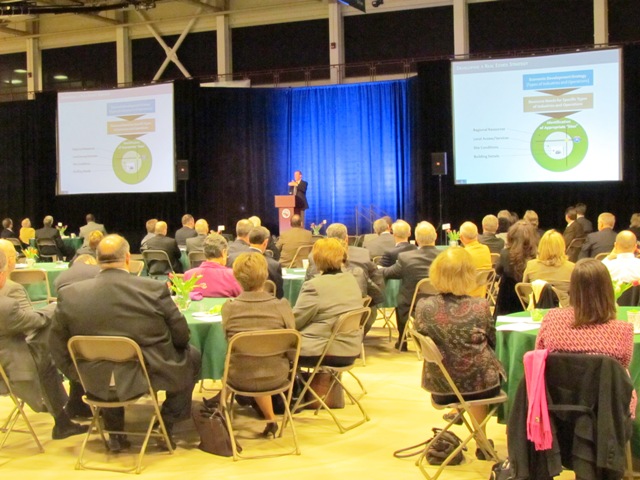
Roanoke County Board of Supervisor’s chairman Mike Altizer said before the summit began that he hoped “by the end of the night the localities could agree to allow their staffs to come together and develop a plan on how we could all come together as a single entity to do something to purchase property.”
“If a business wanted 45 to 100 acres shovel ready that “we don’t have anything,” said Altizer. The Virginia Department of Economic Development won’t send businesses to the region for that reason. “We don’t fit that criteria for 45 acres and up. Those are people that want to bring 200-300 jobs and want to invest up to $200 million and we never get to talk to them.”
If the localities come together the cost for each government would be less and then “we could do something.” It could be in any locality “but we have to agree to share expenses and share the revenues that come from it,” said Altizer. Though broadband fiber optics wasn’t discussed it is part of the equation, he said.
Roanoke City’s Mayor Bowers said, “Anything we can do cooperatively as a region has to be good for the region. Gone are the days where an economic success in Roanoke was just touted by Roanoke. Now we understand that any kind of initiative or success in the region is good for Roanoke and good for any other jurisdiction in the area.”
Roanoke County hosted the economic summit for elected officials from the cities of Salem, Roanoke and counties of Franklin, Roanoke, Botetourt and Montgomery and the town of Vinton. Delegate Greg Habeeb of Salem attended along with representatives for Congressman Bob Goodlatte, Morgan Griffith and U.S. Senator Mark Warner.
The summit was held in conjunction with the Roanoke Regional Partnership and requested by Roanoke County Chairman Mike Altizer. On the agenda was a presentation by John Rhodes, a senior principal with Moran, Stahl & Boyer – site selection and economic development experts with more than 40 years of experience.
Rhodes said there were three levels of employers. The first tier are those who come into the region, the second is an existing business that brings in the services of other businesses and the third tier is everyone else. “All are important to the economy,” he said. The region is attractive and has a reputation for livability.
Small businesses tend to lease existing space while the very large and more unique businesses look for land. “They look for land that is ready to roll,” said Rhodes. There are many large vacant older building like Hanover Direct in the area but the age of these buildings, lack of height and building code compliance hinder reuse. Businesses tend to avoid older building, explained Rhodes.
There is acreage available in the region but it is not contiguous and what there is tends to be chopped up by locality. The ideal is a 100-acre site on the interstate with rail service. “There is no such thing as perfect,” said Rhodes. Easy access and “shovel ready” is still a key attraction for businesses. A level site of 11 acres for a building is also a draw.
With the cost of fuel escalating, rail is preferred over truck transport. Natural gas is an affordable energy source and access to it is essential.
On the plus side Virginia itself is strategically located and is a right-to-work state. The Roanoke area has a preferred population with good access to I-81. The perception, however, is that this part of Virginia is too mountainess. Additionally, the Roanoke Regional Airport is not a hub and has limitations. Several years ago Dell Computers considered Roanoke for a site but the airport could not accommodate 747s for components from overseas.
“Being in the right level of readiness will not guarantee a company will show up,” said Rhodes. “But not being at the right level of readiness will guarantee you they will stay away.” All things being equal businesses consider real estate taxes too.
When localities come together and “you start doing things like this you are saying to the world we’re in it,” said Rhodes.
At the end of the presentation, area officials offered their willingness to assign a member of their staff to form a coalition to address the region’s site readiness challenges.
Mayor Bowers had convened a council meeting since the city charter mandates that when more than two council members are assembled it is considered an open meeting. Councilman Ray Ferris offered City Manager Chris Morrill as a member of the coalition. Other localities have yet to pick their team member but all agreed to participate.
– Valerie Garner

